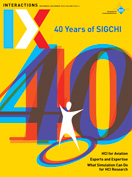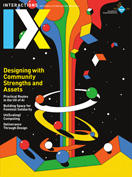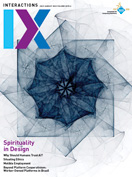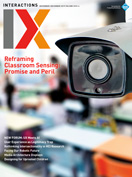Authors:
Johannes Schöning
I am fascinated by novel technology. This had already started by kindergarten, but when I studied computer science, I read Mark Weiser's seminal paper "The Computer for the 21st Century" [1]. This paper awoke my passion for HCI and ubicomp, so I decided to work in this field, as have many other fellow researchers. Even though I admired that Weiser's paper was so much ahead of his time and that many of his predictions and visions came true, I was disappointed that the last sentence never actually turned from vision to reality: "Machines that fit the human environment, instead of forcing humans to enter theirs, will make using a computer as refreshing as taking a walk in the woods." Today technologies are often still developed in such a way that users are not empowered, but instead are subject to a restricted user experience that is limited to a single platform. By empowered I mean "in its strongest sense, that the users of the technology are empowered to solve their own (accessibility) problems" [2].
I am a passionate hiker [3] and love to walk in the woods, but I believe it is getting harder and harder to ignore the negative impacts of many novel technologies: Machines are entering our lives—not vice versa—and unfortunately most are not "as refreshing as taking a walk in the woods." While they shed light on some things, they also can make us blind to what is important in life. We see more and more technology that creates dark forests, or Finsterworlds (by the way, a great movie), which restrict users in their possibilities and force them to stick to closed platforms.
Every day I see new dumb-smart technology presented at conferences and tech shows. The solutions look cool—but solve problems that do not exist.
There are two key challenges in bringing light to Finsterworlds, our technological forests of today, which are often as dark as the Black Forest. First, I think we need a broad understanding of computer technologies. Therefore, we need a solid computer science education from early on. My colleagues and I highlighted this recently in our article on "education in a digitized world" [4]. Second, we build too many "dumb smart" technologies; we plant too many "bad trees." Every day I see new dumb-smart technology presented at conferences and tech shows. The solutions look cool—but solve problems that do not exist. These technologies are often developed in such a way that users are not empowered, but rather subject to a restricted user experience, limited to a single platform. The business models around them are designed to collect as much personal data as possible. The "sweet technological porridge" [5], a reference to the Brothers Grimm, of the Silicon Valley giants has made us "full and lazy," and prevents the critical and creative use of novel technology in a way that it is empowering for users. To be sure, most developers have good intentions when designing those technologies, as they want to: improve efficiency and ease of use, reduce human error, make the user experience more pleasant, and make more informed and better choices for them.
In my opinion, though, many of these developments result in lazy people who don't have to think so much for themselves or remember what to do. That said, we also see a recent trend toward developing "happy apps" and devices for mindfulness, sports, and brain exercises. I have been discussing this a lot with my colleagues. Diana Beirl, Nicola Yuill, and Yvonne Rogers nicely captured this trend in their recent CSCL paper on Amazon's Alexa [6]. But those happy apps, those little flowers, cannot grow unless they have light.
We as computer scientists also need to remove our rose-colored glasses and stop looking at all the technologies with overly optimistic eyes. With the ACM Future of Computing Academy (FCA), we recently published a proposal [7] arguing that the computing research community needs to confront the negative impacts of our innovations much more seriously. To ensure that this more serious identification occurs, our proposal argued for incremental changes to incentive structures in computing research, focusing on how we evaluate the quality of research reports (e.g., papers) and research proposals (e.g., grant proposals) to cut down all the dark trees. I hope if we tackle those two challenges, we will make using a computer as refreshing as taking a walk in the woods, while empowering users.
1. Weiser, M. The computer for the 21st century. SIGMOBILE Mob. Comput. Commun. Rev. 3, 3 (July 1999), 3–11; http://dx.doi.org/10.1145/329124.329126
2. Ladner, R.E. Design for user empowerment. Interactions 22, 2 (Mar.–Apr. 2015), 24–29; https://doi.org/10.1145/2723869
3. Posti, M., Schöning, J., and Häkkilä, J. Unexpected Journeys with the HOBBIT - The design and evaluation of an asocial hiking app. Proc. of the Conference on Designing Interactive Systems: Processes, Practices, Methods, and Techniques. ACM, New York, 2014, 637–646. DOI:10.1145/2598510.2598592
4. https://gi.de/fileadmin/GI/Hauptseite/Themen/Dagstuhl-Erkla__rung_2016-03-23.pdf
5. Schöning, J. User empowerment instead of "sweet porridge." In Germany and the World 2030. Lutz Meyer & Company GmbH, 2018.
6. Beirl, D., Yuill, N., and Rogers, Y. Using voice assistant skills in family life. Proc. of 13th International Conference on Computer Supported Collaborative Learning. International Society of the Learning Sciences, 2019, 96–103.
7. Hecht, B., Wilcox, L., Bigham, J.P., Schöning, J., Hoque, E., Ernst, J., Bisk, Y., De Russis, L., Yarosh, L., Anjum, B., Contractor, D., and Wu, C. It's time to do something: Mitigating the negative impacts of computing through a change to the peer review process. ACM Future of Computing Blog. Mar. 29, 2018; https://acm-fca.org/2018/03/29/negativeimpacts/
Johannes Schöning is a Lichtenberg Professor and professor of human-computer interaction (HCI) at the University of Bremen in Germany. His research interests lie at the intersection of HCI, geographic information science, and ubiquitous interface technologies. [email protected]
Copyright held by author
The Digital Library is published by the Association for Computing Machinery. Copyright © 2019 ACM, Inc.








Post Comment
No Comments Found